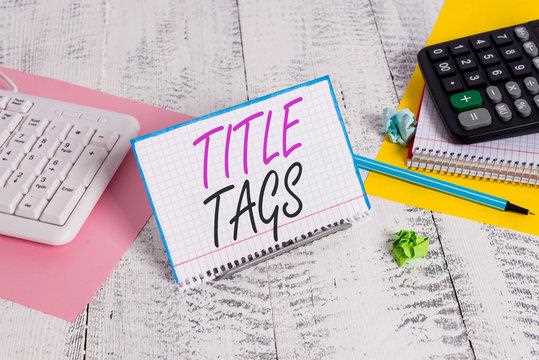
14-Sep-2022
Title Tags and how to optimize title tags for Google
The title tag is an HTML label that exists in the head part of every site page. It gives an underlying signal or setting concerning the effective topic of the page it is on. The title label includes conspicuously on web crawler results pages (SERPs) as it is normally utilized as the interactive connection and furthermore shows up in the program window.
Other than in these two places, the title label isn't generally so noticeable as other on-page web content (e.g., body duplicate, picture content, and different viewpoints). Consequently, the title tag can in some cases be disregarded.
All alone, the title tag little affects natural rankings. No single positioning element is enchanted or strong - particularly assuming that your substance is inferior quality or you've disregarded specialized SEO.
- Google uses the title tag to get an idea of what's on your page and how relevant your content is to users' search queries. By placing a keyword before the title tag, Google will display your web page as the most relevant to the search term. In order for a keyword (search term) to appear in the Google search engine, it must be included in the title tag, as well as in the meta description, H1 tag, URL link, and copy of the web page.
- In search results, Google will generate a title for your site based on the content of your page. If your page matches a search term that is poorly represented in the title, Google may change the title that is displayed. If you see that your page is ranking well for a different combination of keywords...rewrite the title tag to be more relevant to it (if appropriate, of course).
- You can also add a level of exploration for the appearance of other heading tags on page 1 for the keyword or query you're targeting and create a similar one. Because even without considering Google's ranking algorithm, it makes sense for users to crawl the main keyword at the beginning of the title tag. Therefore, having keywords that match what users are looking for directly increases CTR, as the title is considered more relevant.
- Even if you rank well on search engine results pages, a poorly written title tag can prevent you from getting clicks. It doesn't matter if your title tag doesn't collect clicks, even if you rank first in Google search results.
- Google and other search engines consider several factors to understand the quality and topic of a page, and you can get closer to the top of search results with an optimized title tag. Unlike meta descriptions, page titles are one of the important factors Google uses to rank you in search results. Just like the title of a book grabs your attention, the page title meta tag is the first step in inviting people to click on your page on a search engine results page (SERP).
- Title tags should be no longer than 50-60 characters, otherwise, they may be truncated on search engine results pages or if your title is insufficient, Google will automatically provide another title tag.
- If an SEO title tag is too long, Google may truncate the end of the title with an ellipsis (...), potentially preventing site visitors from seeing important information on the page. In some cases, Google may use alternative titles if you include data about them, such as meta tags for Facebook or Twitter.
- Most content management systems like WordPress or Squarespace automatically set title tags when you enter a title on a new page. The goal of optimizing title tags is to match the wording you use to what is being searched for, as long as the intended intent is at the center of the page content
- We can all connect with times we truly need to find a response to something explicit, yet the top websites are responding to an alternate question. The equivalent goes for an incredible substance that gets inconspicuous. You have to check what their intent is all about.
- Understanding what your audience might be thinking is looking for and how they are looking is basic for title tag improvement.
- On the off chance that you don't have the foggiest idea of what words and expressions individuals are utilizing when they are looking, then you're in danger of speculating incorrectly.

SEO and Content Writer
I am Drishan vig. I used to write blogs, articles, and stories in a way that entices the audience. I assure you that consistency, style, and tone must be met while writing the content. Working with the clients like bfc, varthana, ITC hotels, indusind, mumpa, mollydolly etc. has made me realized that writing content is not enough but doing seo is the first thing for it.
Join Our Newsletter
Subscribe to our newsletter to receive emails about new views posts, releases and updates.
Copyright 2010 - 2026 MindStick Software Pvt. Ltd. All Rights Reserved Privacy Policy | Terms & Conditions | Cookie Policy